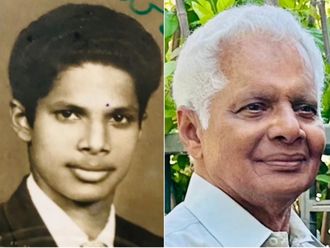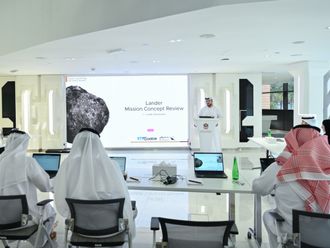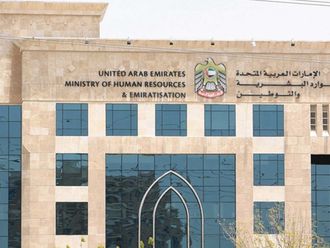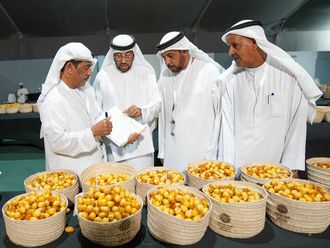In Saudi Arabia, it is the end of the lunar month of Safar and the beginning of summer, which will last until October. Traditionally, Saudis spend at least part of that period abroad, or trek to the cool oases of the Ta'ef region on the Yemeni border.
This year, however, most Saudis will stay at home. The reason? They feel they are no longer welcome at their favourite destination, the United States of America. Or they've decided to wait and see "what happens next".
As one travels around this vast kingdom, almost as big as Europe, the mood is one of quiet concern about a troubling present and an uncertain future. The feeling of uncertainty has just been deepened with the ann-ouncement by Secretary of Defence Donald Rumsfeld that soon almost all the American troops will be withdrawn from the kingdom.
"This is what Osama bin Laden wanted," says a Saudi university teacher. "People wonder when he will get the other things he wanted."
Many Saudis see Rumsfeld's visit as a historic parting of the ways for two traditional allies. "The Americans now have Iraq and no longer need us," says Abdul-Muhsin Al Mualaa, a businessman. "It is as if the ground has fallen [from] under our feet."
In one of those paradoxes of politics, this birthplace of Islam had developed into one of the most pro-American of all Muslim countries.
Since 1980, an estimated 200,000 Saudis have studied in the U.S., and at least a quarter of a million Saudis have visited the country every year. Saudi investment in the U.S. is estimated at $300 billion.
Prince Walid bin Talal, a nephew of the King Fahd bin Abdulaziz, Custodian of the two Holy Shrines, boasts that he is the single biggest foreign investor in New York City. Many top American firms, from Disney to Citicorp, have major Saudi shareholders.
At the other end of the spectrum, Saudi Arabia is the biggest source of American energy imports. It sits upon almost a quarter of the world's known oil reserves, and experts regard the recently developed fields of Shiba as "an almost endless source" of cheap oil. The country's importance as a strategic prize is certain to increase in the coming years as it develops new-found reserves of natural gas.
For over a decade the kingdom played host to the largest Ameri-can military presence between Europe and the Far East. And it has played another crucial role in American global strategy: that of go-between with the Muslim world.
As the site of the holy cities of Makkah and Medina, destination of Islam's two most imposrtant pilgrimages, and host to almost six million pilgrims each year, Saudi Arabia enjoys immense prestige in the Muslim world – a prestige enhanced by the billions it spends on Islamic charities, Quranic schools, aid projects, and patronage throughout the Muslim world.
The "strategic partnership" between Washington and Riyadh began in the 1940s, when the U.S. first established a military presence in the kingdom. In the 1960s and 1970s the two worked closely to deal with the threat of Arab nationalism, backed by the Soviet Union, and to contain the Palest-inian issue. In the 1980s they were partners in stopping the spread of the Khomeini-ist revolution from Iran to other Muslim countries.
Then came their joint venture in support of the mujahedeen fighting the Soviet army in Afgha-nistan. Thousands of Saudis went to fight the Communists in Afghanistan or to raise funds and procure arms for the Afghan mujahedeen. Among those who went was Osama bin Laden, a member of a Saudi family of Yemeni origin.
So close did the two countries become that Washington consulted with Riyadh even on issues such as defeating communism in Nicara-gua and El Salvador. Then in 1990-91, the two worked together to force Iraq out of Kuwait. In an important symbolic gesture, the United States made Prince Khaled bin Sultan, a nephew of King Fahd, deputy commander in chief of the allied forces.
The "special relationship" came to an abrupt end when it turned out that 15 of the 19 terrorists who took part in the September 11 attacks were Saudi citizens, some from prominent families.
As the FBI proceeded to arrest suspects, hundreds of Saudis in the U.S. were rounded up and thrown into prison. Many managed to escape the dragnet aboard specially chartered flights. Among those who escaped were 18 members of the bin Laden family who had been working or studying in the U.S.
Washington retaliated by imposing stiff visa rules for Saudis, reversing a policy under which the kingdom had been among a handful of favoured nations. "For many of us the U.S. has been a second home," says Yahya Al Muqren, a businessman. "My daughter's godfather is an American. Now she comes to ask me why Americans are killing Muslims."
But the foreign minister, Prince Saud Al Faisal, a nephew of the king, dismisses the current tension as "a rough patch". He insists that the USA and the KSA have too many shared interests to drift apart. "Over 60 years of special relationship is not damaged by occasional problems," he says.
That sentiment is not shared in the mosques and the shopping malls. One common feeling is that the leadership has not yet recovered from the shock of September 11 and its aftermath, including the wars in Afghanistan and Iraq.
"It is a pity that the king is unwell," says a senior Saudi on condition of anonymity. "We are used to our leader coming on TV to tell us what to think and how to act. Since September 11, however, we have been receiving conflicting signals from different officials."
That view is disputed by others, who insist that Crown Prince Abdullah bin Abdul-Aziz, who is effectively in charge of day-to-day policy, has been right to steer the kingdom away from an open alliance with Washington.
"Abdullah wants the Ameri-cans to understand that they cannot have something for nothing," says another senior Saudi figure. "He wants Washington to deliver a solution to the Palestinian conflict before demanding the kingdom's help in other fields."
Abdullah was put in charge of running the country in 1995. Since then, the prospect of an early succession has receded. But Abdullah has won popularity by curbing the government's spending, maintaining the country's Islamic character, normalising ties with Iran, strengthening relations with Syria, and taking a tough anti-Israeli stance.
He has also announced some populist measures, designed to counter criticism. Thus, the crown prince has published an ambitious plan for reforming all Arab states, and he has offered to secure the recognition of Israel by all Muslim nations in exchange for the establishment of a Palest-inian state.
In addition, Abdullah has opened a dialogue with a group of intellectuals who last winter published an open letter calling for "serious reforms in the kingdom". In a clear signal that he was serious, the crown prince told a delegation of the reformers that he envisaged a major review of the role played by the Consultative Council, the kingdom's appointed 120-man parliament. The review could lead to the election of members and, more significant, the inclusion of women.
Some reformers dismiss the proposed measures as too little, too late. And Abdullah's policies enjoy little support among members of the royal family. Most want no change at all. A small minority
Amir Taheri: Untying the Saudi-U.S. knot marks end of historic ties
In Saudi Arabia, it is the end of the lunar month of Safar and the beginning of summer, which will last until October. Traditionally, Saudis spend at least part of that period abroad, or trek to the cool oases of the Ta'ef region on the Yemeni border.











